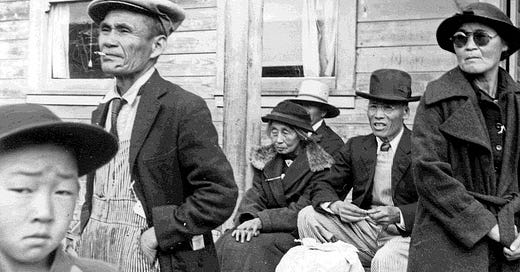Mrs. Gunn's Diary: Feb. 19, 1942
She makes soap and worries about the war; FDR signs Executive Order 9066
Mrs. Gunn was up to her elbows in grease today, making soap. “Had 105 lbs. of grease. This was contributed from the church members to make the soap to sell,” she wrote. Ew.
By 1943 kitchen grease was being collected by the government to make glycerin, needed for explosives and gunpowder. In one of her My Day columns that year, Eleanor Roosevelt wrote, “I have heard many a woman ask how she could do her bit when her days were filled to overflowing with housework and the care of the family. Here is one very important way, and don't let's forget it.”
As Mrs. Gunn converted kitchen grease into soap, she worried about the submarine attacks on merchant ships in the Atlantic, and the string of Allied catastrophes in the Pacific theater. “Now the Japs hope to take Java and Australia,” she wrote.
Today President Roosevelt signed his most controversial executive order, which resulted in the internship of 122,000 residents of the west coast of Japanese ancestry, most of whom were American citizens. Paid subscribers can read on about Executive Order 9066.
The photo of a family of Japanese farm workers waiting for a bus to take them to a relocation center is the work of Dorothea Lange and part of the collection of the U.S. National Park Service. It was accessed via Wikimedia Commons.
Remember, Mrs. Gunn’s diary ends tomorrow, February 20. On Friday, I will introduce the 1930 diary of police Chief Walter Askew of Newnan, Georgia, as he chases down bootleggers, burglars, and car thieves in the Prohibition era. It’s a great time to become a paid subscriber!
Keep reading with a 7-day free trial
Subscribe to Baptists, Bootleggers, and Everything in Between to keep reading this post and get 7 days of free access to the full post archives.




